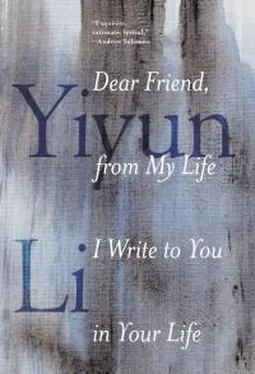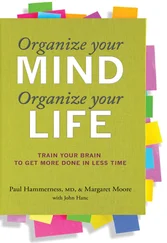Sometimes out of mere mischief I reply with a detailed account of our encounter. People are joyfully surprised when they are remembered, but I have not been honest with them. There is a difference between being remembered and being caught by the mesh of one’s mind.
Many years ago, a young man from a peasant family in south China left home to study theoretical physics at a university. He was the first one in his village to have graduated high school. His mother could only afford to buy him a pair of socks, and the villagers gathered their limited means to give him a suitcase. He traveled north with a pair of socks in an empty suitcase. When he arrived, the university provided him clothes and bedding, and at once he joined the martial arts team. He was not a physical man, but he would compete for the next four years so that he could have enough food.
Eventually the young man met and married the girl from the courtyard. He became a hoarder of things, she a hoarder of memories. Well, at least, we could say, nothing would be wasted or lost, and indeed nothing has been. I grew up with the dread of seeing piles of old newspapers collect dust and used matches put back into matchboxes. But more than that, I dreaded the memories that were not mine, yet were so adamant to be heard and remembered as the only memories that mattered.
What becomes of someone raised by parents who cannot part with their objects and memories? Tangible objects crystallize memories, too. I wonder if there is a similar melodrama in my father’s clinging to small and used things as in my mother’s unrestrained vulnerability and cruelty. Nothingness—holding on to nothing, retaining nothing—was a shelter from melodrama until it stopped being one.
I was in Iowa City to give a reading, and McPherson asked me to dinner at his house. He had laid out plates, silverware, new napkins, glasses, and wine on a coffee table, and had a friend bring in food from a restaurant. Over dinner he talked a lot about his life, some parts I had known, other parts I had heard from people around him. The conversation could have gone on forever, and I constantly watched the time. Before I left, he asked if I could come again the next day, and I said I couldn’t because I had to fly to Chicago in the early morning.
That was when I saw his tears for the first time. I met McPherson during a phase of his life different from when Pancake had met him, and I had never tried to connect the person I knew to the writer at his prime. Once, when he loaned me a book, I saw on the last blank page scribbling of a conversation with Ralph Ellison. I did not ask him what it was he felt compelled to remember. Over the years I nagged at him about his health, and when he was in good humor he would behave like a chastised yet uncooperative child, yet I felt a distance between us. I used to explain to myself that it was a result of my shyness and his Southern manners—he always addressed me as Ms. Li. But I now suspect that I only pretended there was a distance the same way he refused to open the package from Pancake. I wanted to believe I knew McPherson enough through his work. When one understands another person, perhaps knowing no longer matters, or it matters too much for one to bear.
There was a moment at the dinner when I thought I could see many things that were yet to come: McPherson’s future, the deterioration of his health, his loneliness, and his increasing silence; and my future, too. That McPherson is not widely known and is largely forgotten now is not surprising. He rebelled all his life against what others wanted to make him into—an obedient serf, a political warrior. His refusal would be a futile battle in any era and in any country.
When the future becomes memory prematurely, one feels unbalanced. I ran away that evening because I did not want McPherson to see my panic. The next day I called a friend and asked her how he lived without killing himself. It was a terrible question, but what I could not say at the time was this: How could one stop oneself from seeking solace in the peace brought by death? I had indulged that thought at dinner with McPherson, as I had at various times wished that relief for my father. What is more indefensible, to give up one’s own life, or to give up hoping for one’s loved one’s?
It is difficult for anyone to watch someone close suffer. The grief comes from not understanding the pain, and from knowing that suffering, even when it ends, will live on as memory. A child does not, and should not, understand her parents’ memories, yet this incomprehension does not offer exemption. The child in every one of us carries the burden of memory’s melodrama, not only our own, but those before our time.
“Thing were not supposed to be this way,” Ralph Ellison, wounded by his time, said to McPherson. McPherson must have said that to himself, too. Disappointment like that must have come from the hope to be understood. I have run away from it to my nothingness, my fatalism, and my insistence on being irrelevant. Yet I have not had a moment of hesitation to read Zweig or Mansfield or other writers. One is protected in these cases. Their memories will never become mine.
The inadequacy of writing is similar to that of connecting to another person. It is essential that a story allow its melodrama to meet the reader’s, yet melodrama makes such encounters rare.
“Phil Ochs hanged himself. Breece Pancake shot himself. The rest of us, if we are lucky enough to be incapable of imagining such extreme acts of defiance, manage to endure,” McPherson wrote toward the end of his foreword. Such kindness, one cannot help noticing; such a contrast to Mann’s coldhearted judgment. I never asked McPherson whether the thought of suicide occurred to him. I never asked him how he managed to endure. But it doesn’t matter: I have to live in my own cautionary tale. Some people seek victory in that tale, others escape, yet others peace. I still do not know what I want from mine, but one hopes that to accept not knowing, for the time being, is better than to accept nothing.
Two Lives
Until an interviewer asked me if there was a book that I had read too young and thereafter haunted me, I did not realize that I had never used the word haunt, a word I find claustrophobic and insincere. Nor did I know that the word haunt has a connection to home. Etymologically, it is from the Middle English hauten (to reside, inhabit, use, employ), from Old French hanter (to inhabit, frequent, resort to), from Old Norse heimta (to bring home, fetch). When we feel haunted, it is the pull of our old home we’re experiencing, but a more upsetting possibility is that the past has become homeless, and we are offering it a place to inhabit in the present.
I told the interviewer there is a book I may have read too early, though I wouldn’t call it haunting in any way.
A book I read too early: to answer that involves sorting through memories—one does it with a dread of inaccuracies. When I started middle school, my father began jogging early in the morning, leaving home before I left for the bus stop, no more than a few steps ahead of me. It has taken me thirty years of not remembering to understand what I had thought of as his exercise habit as a father’s tact. At six thirty the road between our apartment and the bus stop was not the safest place for a child. He never hovered, but there were days when the bus was early, and he would be at the stop before me, holding the door so that the bus would not leave without me.
Twenty minutes into the ride, I changed route at another stop. Several schoolmates also waited for the bus there—a longer ride that brought us to the outskirts of the city, where our school had been built on the land of the Old Summer Palace, a place of ruin and wilderness at the time. During the first week of middle school, a girl and her father ran for a bus that was just pulling in. We all watched while the father, holding the door for the girl, hurried her on. Why didn’t you take the bus, he asked afterward—none of us had moved. We looked at one another, and finally someone replied that it was the wrong one. Though bearing the same route number, it was the regional line, which would never get the girl to school.
Читать дальше












